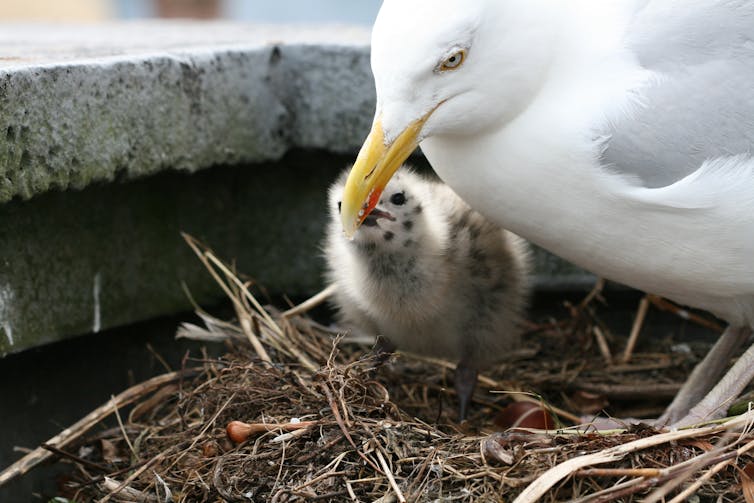Why you should have more sympathy for seagulls – and how to stop them stealing your chips
On a summer’s day at the beach, the sound of seagulls is part of the ambiance. But what if they’re in the middle of a city or just had your lunch? Not many people like seagulls. You’re loud, messy, and quite partial to whatever you eat. As annoying as they are, their reputation for brash behavior hides another story.
There are many different species of gulls. The birds that most people mistake for gulls, the ones with silver backs and pink legs, are Herring Gulls.
They are the species most likely to nest in houses and steal your chips. As these gulls increasingly nest in urban areas, they are seen more frequently by humans. Although there seems to be a lot of them, the population is decreasing. Seagulls, which nest in natural locations rather than man-made structures, are in dire straits.
All seven seagull species breeding in the UK are of conservation concern. Herring Gulls are on the UK Red List, the highest level of concern.
Some people believe that the availability of food from landfills has artificially increased gull numbers in recent years, but in fact, food poisoning from landfill feeding and culling has contributed to their decline.

Dan Bagur/Shutterstock
A different view
Gulls are very hated when they swoop down on people, either to get food or to protect their chicks. Sometimes I think people would be more understanding if they put themselves in a seagull’s shoes. Most of us were pretty lucky to be born human, and sometimes we take things like food and safety for granted. Gulls cannot rely on a steady supply of groceries from the supermarket or know that you will not harm their chicks, which both parents are diligently caring for.
When a female and a male mate, they usually do so to the point of death. Each pair defends a nesting and feeding area. The loud calls they make may seem annoying and pointless, but it’s gulls’ way of telling others where their territories are.
Seagulls are so-called kleptoparasites. They steal food from each other and from other species. This is not uncommon in birds, but gulls are unusual in that they take food from humans. This is risky behavior. An animal the weight of a bag of sugar is massively disadvantaged compared to a human. In fact, only a small minority of gulls are brave enough to do so.
Humans perceive seagulls as greedy. They seem to devour anything they can find in one big gulp. But they actually store food in their crops, a pouch that functions similarly to a shopping bag and can be eaten from later. From a seagull’s point of view, you could starve if you don’t eat the food that’s in front of you. It is a result of necessity, not greed.
They are not after you, they are trying to find enough food to survive. One study found that these clever birds learned an intricate process to make sea squirts safe for consumption. A herring gull has even been observed using bread to bait fish.
understand seagulls
Urban gulls are highly adaptable and savvy. They even learn patterns of human activity to help decide where and when to forage. A few years ago I started a research project to understand the feeding interactions of seagulls with humans. I had noticed that gulls often snatch food from people by catching them off guard. Previous research showed that several species of birds are alert to the human gaze. I wondered if seagulls pay attention to where people are looking and prefer to approach food when not being watched.
I designed a study to test this idea and determined how long it took seagulls to peck at a sealed bag of chips I placed on the floor in front of me—once when I was looking at them and once when I was looked away. I found that seagulls took longer to peck at the chips when I watched them. I also found that gulls are attracted to food they’ve seen humans interact with, probably because they’ve learned that we often leave food waste lying around.
What does this mean for our interactions with seagulls? Well, we can reduce unwanted encounters by properly managing our food waste. If we choose to eat our meal in a seagull hotspot, it helps to be alert: look for and watch for seagulls. Check behind you, sit under an umbrella or against a high wall so seagulls don’t get out of sight.
Seagull behavior may seem bad, but we have a lot of leeway to change it without resorting to extreme measures. Seagulls make the best of a bad situation caused by our own activities and our cities could be their last resort.